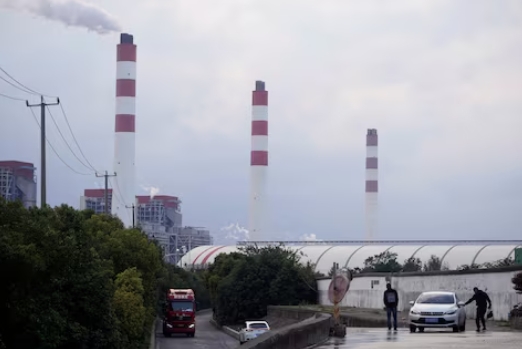
Men stand by a car near a coal-fired power plant in Shanghai, China October 21, 2021.
The coal sector in China is grappling with excess supply following a significant production increase after shortages and power outages in 2021. The expanded output has led to coal surpluses that exceed the consumption capacity of the country’s extensive thermal power network, the largest globally.
To bolster domestic coal producers facing profit challenges, the National Development and Reform Commission (NDRC) has directed power plants to prioritize local coal and boost thermal coal reserves by 10%, aiming for a total of 215 million metric tons by June 10, sources said. These sources, who were not authorized to speak publicly, requested anonymity.
Despite these efforts, two coal traders among the sources noted: “The guidelines are unlikely to significantly increase purchases or stabilize prices,” citing the already high inventories across the supply chain. Stockpiles at mines have risen 42% compared to last year, while coal reserves at northern Bohai ports have increased by 25%, according to China Energy Daily.
The NDRC has also urged buyers to source coal from northern ports to reduce the high stockpiles there, three sources confirmed. The agency did not immediately respond to a request for comment.
Coal prices in China have continued to decline steadily. On Tuesday, medium-grade coal with a heat value of 5,500 kilocalories per kilogram was priced at 620 yuan ($86) per metric ton, marking the lowest level since March 2021. The price drop has prompted some buyers to seek spot market purchases instead of honoring long-term contracts.
In 2024, China’s coal imports reached a record 542.7 million tons, but imports fell 16% year-on-year in April, with expectations of a further decline this year. Meanwhile, domestic coal production has continued to grow, rising 6.6% from January to April to 1.58 billion tons, despite a 48.9% drop in industry profits over the same period, according to official data.
Toby Hassall, lead coal analyst at LSEG, commented: “They’re very mindful to avoid a repeat of [the 2021 and 2022 shortages].” He added: “They will tolerate a period where some domestic production is really struggling,” reflecting the government’s cautious approach to avoid supply disruptions.